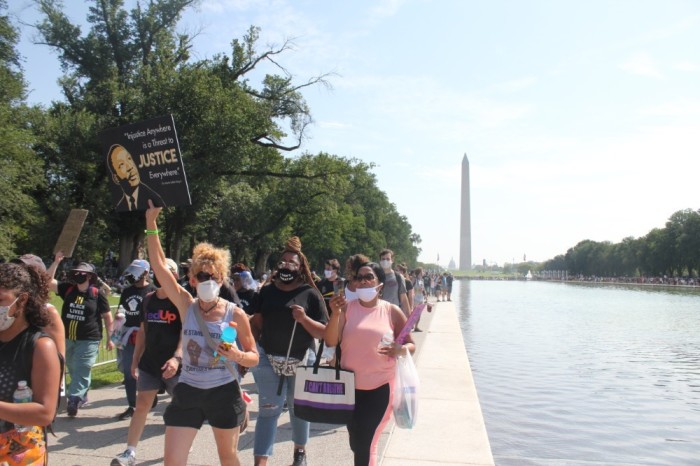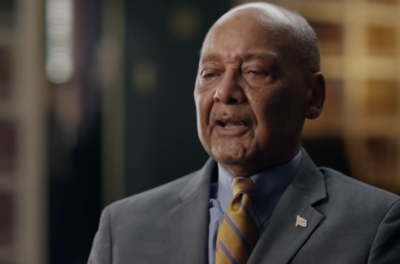Black civil rights activist says America has a 'grace problem,' not a race problem

A longtime African American neighborhood empowerment leader slammed critical race theory during an evangelical seminary webinar over the weekend, arguing that the United States has a “grace problem” instead of a “race problem.”
Bob Woodson, the director of the Woodson Center and founder of the National Center for Neighborhood Enterprise, participated in the Southern Evangelical Seminary's online event Saturday, "Awaken: Thinking Well About Wokism, Social Justice, & Racial Reconciliation."
The civil rights veteran, who once worked on community development programs for local and national organizations, including the NAACP, was asked, “Is America systemically racist?”
Woodson shared his belief that critical race theory, a theoretical framework on systemic racism in America being pushed by some in academia and the political left, "should be replaced by critical grace theory."
“America does not have a race problem, but it has a grace problem," Woodson said.
Woodson attributed the problems ailing African Americans in contemporary American society to the expansion of the social safety net instead of systemic racism.
Woodson explained that “when whites were at their worst, blacks were at their best.” He discussed the role of the black church in helping to improve the lives of African Americans in the century following the abolition of slavery.
Upon discovering that the black community had a 75% illiteracy rate, Woodson said many black churches opened Sabbath Schools.
“Within 40 years, that level of illiteracy went down from 75% to 30%,” he recalled.

Woodson detailed how “Christian values” and “Christian principles” enabled the African American community to experience relative peace and prosperity despite the adversity they faced due to the Great Depression and racism.
“We had the highest marriage rate of any other group in society during [the] depression because of our faith and because of … our attitude of self-determination," he explained. "Elderly people could walk safely in those communities without fear of being assaulted by their grandchildren.”
“Eighty-five percent of all black households had a man and a woman raising children,” he added, noting that “church attendance was the absolute highest” in the African American community.
He lamented that “the culture shifted in 1965” when “leftist sociologists” at the Columbia University School of Social Work began to “promote socialism” and used “the plight of the blacks” to accomplish that goal.
Woodson said that these sociologists sought to “separate work from income,” thereby making fathers “redundant” and leading to an “increase in drug addiction and [the] school dropout rate.”
They aspired to “enlist as many people as they could to go into the welfare system,” he said, which would force “America to change and to begin to redistribute income."
At this time in American history, government poverty programs began to “open offices and recruit people into the welfare system," he continued.
“Over the course of three to four years in the '70s, millions of blacks flooded into the welfare system at a time when the unemployment rate in New York for black men was 4%,” he asserted. “And as a consequence, we saw the out-of-wedlock birth rate began to soar. There was this massive decline. As government intervened and began to take the place of the family … we witnessed the kind of decline … that we’re experiencing today.”
Born in 1937, Woodson served with organizations such as the National Urban League in New York City during the early 1970s. Afterward, he served as a resident fellow at the American Enterprise Institute and also directed the Neighborhood Revitalization Project in Washington, D.C.
Woodson's organization, the Woodson Center, seeks to "bring recognition and funding to strengthen the efforts of indigenous neighborhood leaders and organizations that are effectively addressing critical problems of their communities through innovative initiatives."
Woodson said the organization applies “the principles that operate in our market economy” to the social economy. Specifically, he illustrated that “only 3% of the people in our market economy are entrepreneurs but they generate 70% of all the jobs.” He emphasized that “if you say that 70% of the black families today are raising children that are dropping out of school, in jail, on drugs, it means that 30% are not.”
“What the Woodson Center has done over the course of … 40 years is we have gone into these 30% of … households, and we found the Christian virtues alive and well," he said.
In these households, “people are raising children successfully in the presence of these challenges.” The Woodson Center has studied the “successful efforts” of these households and worked to promote them in the African American community as a whole.
He presented “powerful examples of people who are achieving against the odds” and true stories about the impact of the black church and Christianity in reversing the fortunes of the black community in some parts of the country.
In one example he mentioned, gangsters had “taken over” a public housing development in Washington, D.C. But when “some Christian women came together and formed a management system and began to reculturate people,” the situation in the neighborhood turned around.
“They drove the drug dealers out. And they began to … minister to these children, to mentor them. And in the course of 10 years, 600 of these children from this desolate, crime-ridden, drug-infested neighborhood came … to become restored and they went on to college," he recalled.
Woodson praised the efforts of a man named Leon Watkins, who lived in South Central Los Angeles, where the Eastside Crips were “terrorizing the community.” According to Woodson, Watkins “put wanted signs all over” and “met with these gang members one-on-one.”
Watkins met with the leader of the gang and talked to him for three hours.
“The next day, he had him in Bible study. And in one week, he had the whole 26-member gang in Bible study,” he continued.
“That gang went from terrorizing that community to protecting that community,” Woodson said. He cited the aforementioned examples as part of a curriculum framework that pushes back against critical race theory by taking “lessons from the past” and sharing stories of “the present of grace in action.”
Woodson urged people to follow the advice of the late civil rights icon Dr. Martin Luther King, who believed that “we should not enter into this bitter conflict with the purpose of humiliating or destroying our enemy. But we should do so with God’s love and God’s grace and we should do so with the goal of transforming the oppressor.”
“King believed that the goal was not to defeat or humiliate the adversary but to humanize him or her to plant the seeds of friendship or eventual alliance," Woodson maintained. "Dr. King called that spiritual aggression."
Woodson portrayed critical race theory as the antithesis to this line of thinking.
Critical race theory is defined by Encyclopedia Britannica as an intellectual movement and loosely organized framework of legal analysis that argues race is a socially constructed category "used to oppress and exploit" people of color.
The reference source reports that “critical race theorists hold that the law and legal institutions in the United States are inherently racist insofar as they function to create and maintain social, economic, and political inequalities between whites and nonwhites, especially African Americans.”
“It’s really stereotyping that we should define not by God’s judgment on us or God’s grace, but that we should be defined as a group … as a category," Woodson argued.
Describing that idea as “ridiculous” and “really harmful,” Woodson stressed that “that’s what we fought against.” After quoting from King’s famous call to “be viewed by the content of your character and not by the color of your … skin,” he slammed critical race theory for saying “that we ought to be defined by our skin color, not by our actions.”
While most of his speech focused on the challenges facing the African American community, Woodson argued that the U.S. as a whole is “in a moral and spiritual freefall" that is "consuming people of all classes and all areas.”
Woodson pointed to “a moral and spiritual emptiness in the lives of our young people” who are “wandering through life without content or purpose in their life." He warned that “when you wander life without content or purpose … you devalue life and therefore, you won’t hesitate to take someone else’s or your own.”
“We must address this crisis among our young people today but we cannot do that as long as we are divided in this nation by race," Woodson concluded. "I think this current racial crisis is a manufactured crisis by elements on the radical left that really wants to seize on … America’s birth defect of slavery … and Jim Crow as a bludgeon against the country to undermine the virtues and principles of this nation."
The Christian Post’s Executive Editor Richard Land was the president of SES until July 2021 and presently serves as an adjunct professor and president emeritus.
Ryan Foley is a reporter for The Christian Post. He can be reached at: [email protected]




























